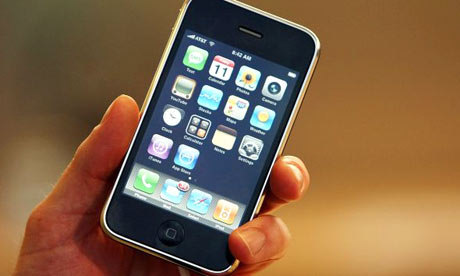New Japanese smartphone will have radiation detector
CNN
By Kyung Lah, CNN (CNN) -- Talk about a "smart" phone—Japan's latest mobile phone sensation also happens to be a radiation detector. The Pantone 5 107SH is the world's first mobile phone with a built-in radiation sensor, merging phone technology with ...
2009.3.2
Does Japan really hate the iPhone?

A reporter holds the new Apple iPhone 3G. Photograph: Mario Tama/Getty Images
A recent sequence of stories about the iPhone's level of success in Japan – a notoriously tough market for Western companies to crack - has turned into an avalanche of inaccuracies, accusations and mudslinging.
The furore was started by the news that Japanese phone network Softbank was going to start subsidising iPhones, and offering them free with a contract. This was reported by some outlets as a tacit admission of failure - including CrunchGear, which said it clearly indicated that "sales need a boost" (despite admitting there were "no official statistics" on iPhone sales in Japan).
The assumption that giving away phones for free is intended to stimulate demand makes sense, but to claim it represents failure ignores out the fact that free phones – subsidised by a long contract - are the norm in many countries outside of America, even for high-end smartphones and expensive new handsets.
However, the presumption that the move to free was the result of terrible sales continued to spread until, finally, Wired.com's Brian X Chen tipped things over the edge. His story, entitled "Why the Japanese hate the iPhone", suggested that "Apple's iPhone has wowed most of the globe – but not Japan, where the handset is selling so poorly it's being offered for free".
Like any negative comment about Apple, that drew vociferous reaction from the company's legion of fans – including as an absurd 3,000 word rebuff/rant by Apple Insider – but, intriguingly, also from one of the subjects interviewed for the article, Noboyuki Hayashi. He responded by publishing his actual view of the iPhone in Japan, including the full text of the email he sent Chen (none of which was used in the article).
This all proved mildly entertaining for observers - but while it served to reiterate a couple of well-known facts (journalists get things wrong sometimes; Apple has a vast army of dedicated defenders) it did little to shed light on whether or not Japanese consumers actually like the iPhone.
The best answer for that question comes from sales figures, and there aren't any official numbers available at the moment. However, Softbank said last year that the iPhone was boosting subscriber numbers and one industry estimate suggested that Japanese consumers had bought 200,000 iPhones in the three months after it launched last summer (Hayashi revised that figure to suggest it was in excess of 300,000).
With concrete numbers telling story, that figure was contrasted with unsourced claims that Softbank and Apple had wanted to achieve 1 million units sold by the end of 2008. However, given that O2 has admitted it took 16 months to sell 1 million iPhones in Britain, reaching a similar number in less than six would be a stretch - even in Japan's mobile-crazy environment.
All that's clear is that while the iPhone might not be a strong player in Japan's mobile culture – and with no support for emoticons, no built-in TV, no multimedia messaging it's not a surprise - it seems that plenty of Japanese people like it well enough.
Not as exciting, but probably a bit more realistic.
沒有留言:
張貼留言